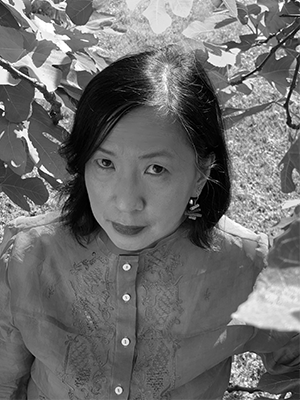Dear Exile,
I love the first
cold slap of water coming through
the pipes in winter, the cornhusk
smell of heat pressing down
on eyelids in summer;
how windowless nights
speckle fields with faint
yet persistent
light—
If I gave up,
if I stopped desiring
the ordinary things, ordinary
rituals we hardly think about
even as we do them—
Could I forget, completely?
Moths tuck themselves
into drawers, where they
work out their hidden
citzenships in scripts
of perforated silver.
Taut
hammock threads
loosen; day gives in to night,
and night again to day,
Who was I before the earth
shook my world to pieces, before parts
of barely formed history were buried
along with beams of a house that no longer exists?
At the Chinese restaurant
they served coffee or service tea
in thick white cups,
and old men in frayed sweaters
hunched eternally over chessboards.
Roads wound through
mountains but at a certain juncture,
one could glimpse the sea.
Perhaps I am that house
to which I can no longer return. Even now,
more than just the stones are forgetting me.
Phenomenology of Return
Don’t we all wish to return, to discover how infinity reaches across the world in a shimmer of overlapping circles, unfazed by obstacle? It simply goes around each tree in the wood, spreads a filmy veil over every house, falling- down shed, office building, and church; the sign above the 24-hour drugstore and pool hall; the alley where stray cats congregate, giving rise to rumors about the most delicious steamed meat buns in the noodle shop next door. In the story about a fish that grants a boon, the fisherman’s wife knows that the sweetest meanings are always closest to the bone. She tells him to go back and ask a deeper question, which sadly he interprets as merely a demand for more. Here she is, setting out to do the hard work herself then— peeling back the body’s outer cover, waterproofing the heart, re-rigging the wings. So much ceremony, in order to arrive at the spot where the water gushes without measure, gives before one even thinks to ask.
~ Lithoredo abatanica
One of my favorite parts in Woman Warrior is when a bird leads the girl deep into the mountains, where an old couple who are really Jedi or Kung Fu masters train her to become a great warrior. She fasts for days and days then eats only ferns or moss or shoots, drinks only dew or melted snow, which sounds more extreme than keto. When her hunger is almost unbearable, she either hallucinates or a rabbit appears and jumps into the fire, sacrificing itself so she might eat every part of it, return to the world strengthened, and vanquish all her country's foes. I don't know how she does it: how she demolishes entire armies and rescues women that have been kept in basements or dungeons, then returns to her village, serene as can be, to take up again the ordinary life of wife and daughter. When I was a thin and scabby- kneed schoolgirl prone to nosebleeds and allergies, you could see clear across the roofs of neighboring houses to the parish church and adjacent elementary school and tell when students were dismissed for the day. Then my mothers would whip up an afternoon snack: hotdog slices piled on a plate of fried rice; on the side, a bottle of orange soda or Coke. They'd sit me down as soon as I came through the door; I ate and struggled to finish everything, not sparing the last grain, as they stood sentinel on each side. Heroic eating, scholars call it—that trope in novels where immigrant characters pick the flesh of fish and fowl close to the bone, then boil these to get at the nourishing marrow. Neck bones and gizzards, chicken feet, yards of innards washed clean to make garlands packed with meat and onions and blood—Which is to say, all the parts that others deem savage, though abroad they might try haggis and a wee dram. This is not to be confused with Mukbang, those YouTube cooking/eating broadcasts where in one sitting, the hosts push enough noodles and eggs and hot sauce into their mouths to feed a dozen men. Some of the most amazing are petite women like Yuka Kinoshita, who has more than five million followers and can pack anywhere between five and twenty-five thousand calories into her wispy frame. Since I've become someone who saves all the leftovers in the fridge, I'm not sure how to think of this kind of extravagance. While I take pleasure in food and flavor, I like to think that eating could have some kind of quiet purpose beyond itself— perhaps like rock-eating shipworms who tunnel with ease through limestone as if it were a loaf of sourdough or an apple: changing in time a river's course, leaving behind a hive of hollow cells, tiers of capsule hotel- like spaces where snails and crabs and fish could take up residence.
